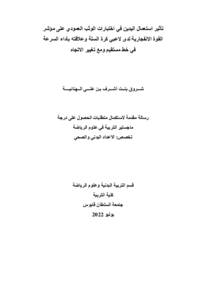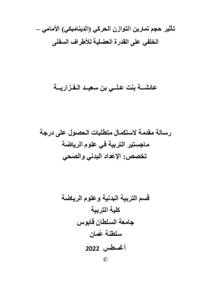وثيقة
تأثير استعمال اليدين في اختبارات الوثب العمودي على مؤشر القوة الانفجارية لدى لاعبي كرة السلة وعلاقته بأداء السرعة في خط مستقيم ومع تغيير الاتجاه.
عناوين أخرى
The Effect of using arms in Vertical Jump Tests on the Reactive Strength Index of Basketball players and its relationship to sprints with and without changing of direction
الناشر
جامعة السلطان قابوس.
ميلادي
2022
اللغة
العربية
الملخص الإنجليزي
The aim of this study was to identify the effect of using arms in Vertical Jump test on the Reactive
Strength Index (RSI) of basketball players and its relationship to sprints (speed 20m) and change of
direction (T- test) performance. The study sample consisted of 20 Basketball players of junior youth,
(age: 14.25±1.59 years), (body mass: 58.28±15.41 Kg), (height: 170.60±11.32 m) and (body mass
Index: 19.73±3.72 Kg/m2
) from Oman Basketball Association Clubs. Participants performed the
following Jump tests: Countermovement Jump (CMJ), Free Countermovement Jump (FCMJ), Drop
Jump (DJ) and Free Drop Jump (FDJ). The RSI has been calculated by dividing the flight time by the
take-off time during tests of: CMJ (RSICMJ), (RSIFCMJ) and DJ (RSIDJ), (RSIFDJ). They also performed
T-test and Speed 20m test. The results demonstrated the effect of using arms on the (RSI) calculated
from CMJ test (p=0.038, 0.26±0.52, 0.14±0.46), and DJ test (p=0.0009, 0.24±0.78, 0.26±0.68). Also,
the results demonstrated a significant positive correlation between the RSICMJ and RSIFCMJ (p≤0.01,
r=0.554), and also between RSIDJ and RSIFDJ (p≤0.01, r=0.81). There was no significant correlation
between RSI calculated from all jump tests on the one hand and T-test & Speed 20m test on the other
hand. These results indicate that using arms affects calculating the RSI through CMJ and DJ tests. In
addition, the RSICMJ and RSIFCMJ are considered independent variables that evaluate different
capabilities, on the contrary of RSIDJ and RSIFDJ. These results are very important to the coach and the
physical trainer in terms of evaluating muscle's ability and designing the appropriate plyometric
programs to develop the muscle's ability.
المجموعة
URL المصدر
الملخص العربي
هدفت الدراسة الحالية الى معرفة تأثير استعمال اليدين في اختبار الوثب العمودي على مؤشر القوة الانفجارية )RSI )لدى لاعبي كرة السلة وعلاقته بأداء السرعة في خط مستقيم 20م )m20 Speed )ومع تغيير الاتجاه )test-T). تكونت عينة الدراسة من 20 لاعب في كرة السلة من فئة الشباب الناشئين )العمر: 1.59±14.25 سنة(، )كتلةالجسم15.41±58.28: 2 كجم(، )الطول: 11.32±170.60 م(،)مؤشركتلةالجسم3.72±19.73: كجم/م ( التابعين ألندية الاتحاد العماني لكرة السلة. قام المشاركون بأداء اختبارات الوثب التالية: اختبار الوثب العمودي المسبوق بحركة تمهيدية بدون استعمال اليدين )CMJ )وباستعمالهما )FCMJ )واختبار الوثب العميق بدون استعمال اليدين )DJ )وباستعمالهما )FDJ). تم احتساب RSI من خلال قسمة زمن الطيران على زمن الاقالع خلال اختبارات CMJ( RSICMJ )و)RSIFCMJ )وDJ( RSIDJ ) و)RSIFDJ). كما قاموا باختبارات test-Tو m20 Speed. أظهرت النتائج وجود تأثير الستعمال اليدين على RSI المحتسب من اختبار CMJ( ،0.14±0.46 ،0.26±0.52 0.038=p)، واختبار DJ( 0.26±0.68 0.24±0.78, 0.009,=p). كما أظهرت النتائج وجود علاقة طردية ذات داللة إحصائية بين RSICMJ وRSIFCMJ( 0.554=r 0.01,≤p )وكذلك بين RSIDJ وRSIFDJ( 0.81=r 0.01,≤p). لم يتم العثور على علاقة ذات داللة إحصائية بين RSI المحتسب من كافة اختبارات الوثب من ناحية وm20 Speed وtest-T من ناحية أخرى. تشير هذه النتائج الى أن استعمال الايدي يؤثر في احتساب RSI من خلال اختبارات CMJ وDJ. وأن RSICMJ وRSIFCMJ يعتبران متغيرين مستقلين ويقيمان قدرات مختلفة على عكس RSIDJ وRSIFDJ. تعتبر هذه النتائج ذات أهمية بالنسبة للمدرب والمعد البدني في تقييم القدرة العضلية ووضع البرامج البليومترية المناسبة لتطويرها.
قالب العنصر
الرسائل والأطروحات الجامعية


